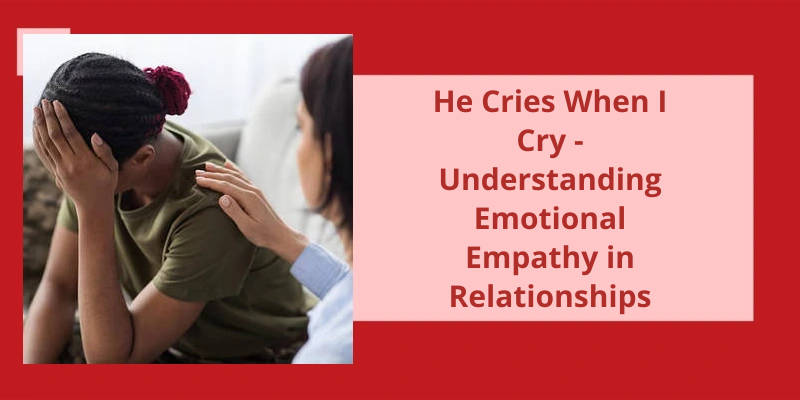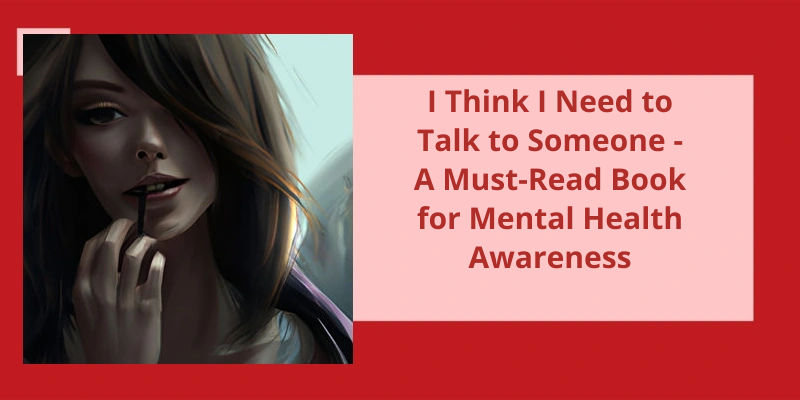In the intricate tapestry of human relationships, there exists a profound phenomenon known as emotional empathy – a potent and compassionate force that binds individuals together on a deeply intrinsic level. As one delves into the essence of this unique connection, one encounters a mesmerizing tale of genuine understanding and vulnerability, where the tears of one become the tears of another. A captivating embodiment of this emotional symbiosis lies in the narrative of "He Cries When I Cry: Understanding Emotional Empathy in Relationships." Within the context of this profound exploration, the focal point gracefully dances upon a lover who possesses the extraordinary ability to feel the anguish and sorrow of their beloved to such an extent that tears cascade down their own cheeks. This unspoken yet eloquent display of empathetic resonance encapsulates a treasure trove of tenderness, signifying an unparalleled comprehension of the other's pain. Amidst the complexity of human emotions, this manifestation of empathy emerges as a priceless gem, reinforcing the unyielding bond between kindred souls and illuminating the profound depths of human connection.
What Does It Mean When a Guy Cry for You?
This level of emotional vulnerability can be seen as a positive sign in a relationship, as it demonstrates that the man is willing to let his guard down and show his true feelings. It also shows that he values your emotional connection and wants you to know the impact you’ve on him.
When a guy cries for you, it also signifies a strong level of emotional empathy. It means that he’s able to truly understand and feel your pain or emotional distress. This kind of deep empathy is a key component of a healthy and supportive relationship, as it shows that he’s not only there for you, but that he actively senses and shares your emotions.
It shows that he deeply cares about your well-being and is deeply affected by any pain or difficulties you may be experiencing. It’s his way of expressing his love and concern for you as he’s unable to physically solve your problems. This type of support can be incredibly comforting and reassuring, as it shows that he’s there for you emotionally, even if he cant fix everything.
It takes a significant level of trust to allow oneself to be vulnerable and express their emotions in such a raw and open manner. It shows that he feels safe enough with you to let his guard down completely, which is a crucial aspect of building a strong and intimate relationship. This level of trust can deepen your bond and strengthen your connection as a couple.
It also indicates a strong sense of empathy, support, and trust. Understanding the significance of his tears can help foster a deeper understanding and appreciation of his emotions, strengthening your relationship even further.
Expressing emotions and crying in a relationship is a natural and healthy way to connect with your partner, fostering understanding and empathy between the two of you. However, if crying becomes a habitual response or is accompanied by recurrent heated arguments, it could indicate underlying emotional needs that are unmet within the relationship. These needs may vary from feelings of stagnation or discontentment to more complex issues such as trust. Addressing and remedying these concerns can pave the way for a healthier and more fulfilling relationship.
What Does Crying in a Relationship Mean?
Crying in a relationship can hold various meanings depending on the context and individual dynamics. In many cases, shedding tears in front of your partner can actually strengthen the emotional bond between you both. It signifies a level of vulnerability and trust that allows for a deeper connection. When you cry in the presence of your partner, it invites them into your emotional world and gives them the opportunity to comfort and support you, fostering a sense of intimacy.
However, if tears and arguments become a frequent occurrence in the relationship, it may be a sign that there are underlying issues that need attention. Perhaps you’re feeling unfulfilled or bored in the relationship, longing for something more. It’s crucial to communicate these feelings with your partner openly and honestly. By addressing these concerns, you both can work together to inject new life and excitement into the relationship, rekindling the emotional connection that may have been lost.
If you find yourself frequently in tears due to mistrust or insecurities, it’s essential to address these issues head-on. Building trust requires open communication and a willingness to work through past hurts. Seeking professional help or couples therapy can provide a safe space to explore and heal these trust issues, enabling both partners to feel secure and emotionally supported.
It’s vital to be aware of the emotions behind the tears and use them as a starting point for deeper conversations. By taking the time to understand and empathize with one anothers feelings, partners can create a stronger emotional foundation, leading to a healthier and more fulfilling relationship.
When a man experiences intense emotions during sexual intimacy, it isn’t uncommon for tears to flow. This phenomenon occurs due to the release of hormones like oxytocin and dopamine, which generate a sense of pleasure and deep connection with one’s partner. It’s important to note that crying during such moments is a natural reaction to overwhelming emotional experiences, irrespective of whether those emotions are positive or negative.
When a Man Cries While Making Love?
When a man cries while making love, it can be a powerful and profound experience for both partners involved. Sexual intimacy is a deeply emotional act, and it isn’t uncommon for intense emotions to come to the surface during this time. Our bodies release hormones, such as oxytocin and dopamine, during intercourse, which bring feelings of pleasure and connection to our partner. These intense feelings can sometimes be overwhelming and result in tears.
It’s important to create a safe space for open communication and emotional expression, allowing both partners to feel comfortable and accepted in their vulnerability. It’s also important to remember that these tears don’t necessarily indicate any underlying issues or problems within the relationship; rather, they’re simply a natural response to the intensity of the moment.
It’s a reflection of the profound emotional connection and vulnerability that can be achieved through sexual intimacy. Understanding and accepting these tears as a natural part of the emotional experience can enhance the connection and satisfaction within the relationship.
The expectation for men to suppress their emotions has lasting effects on their mental health and emotional well-being. It creates a sense of shame and isolation, hindering their ability to express vulnerability. However, as society evolves and challenges these stereotypes, it’s crucial to understand the perspective of men when it comes to crying. Unveiling their thoughts, experiences, and opinions can shed light on this cultural phenomenon and prompt a deeper conversation about the importance of emotional expression for everyone, regardless of gender.
How Do Men Feel About Crying?
How men feel about crying varies greatly depending on their personal experiences and cultural norms. In many cultures around the world, there’s a deeply ingrained belief that men should be strong, stoic, and show little to no emotion. This societal expectation often places a heavy burden on men to suppress their feelings, including the act of crying. Men who adhere to this belief may feel ashamed or emasculated when they find themselves in situations that evoke tears.
When men are unable to openly express their emotions, it can create a barrier in their relationships, as their partners may struggle to understand their needs and provide support. In some cases, men might even find it difficult to identify or connect with their own emotions because of the societal pressure to suppress them.
It’s crucial to challenge and dismantle the stereotypes and expectations surrounding male crying. By creating a safe and non-judgmental space for men to express their emotions, we can foster healthier and more fulfilling relationships. Emotional empathy plays a significant role in understanding and validating the emotions of our partners, irrespective of their gender. When we allow men to cry and provide support and empathy, we strengthen the emotional connection within relationships and promote a more understanding and compassionate society.
The Impact of Toxic Masculinity on Men’s Attitudes Towards Crying
- The suppression of emotions
- Expectations of emotional strength
- Misconceptions about vulnerability
- Stigma surrounding expressing emotions
- Negative effects on mental health
- Influence on relationships
- The perpetuation of harmful stereotypes
This emotional reaction from your boyfriend may stem from his perception of your crying as a hindrance, triggering his defense mechanism rather than evoking empathy or vulnerability. Instead of responding with compassion, he may resort to irritability or anger as a way of coping with the situation.
Why Does My Boyfriend Get So Upset When I Cry?
This might stem from a learned behavior or past experiences where crying was seen as a sign of weakness or vulnerability that needed to be avoided or suppressed. Your boyfriends defensive response could be an attempt to distance himself emotionally and protect himself from feeling the pain or discomfort that your tears evoke. He might fear being overwhelmed by the intensity of his emotions or worry that he won’t know how to provide the comfort and support you need.
It’s important to remember that everyone reacts differently to emotional situations, and your boyfriends response doesn’t necessarily reflect a lack of empathy or care for you. It may simply be his way of coping with emotions, even if it seems counterintuitive. However, this doesn’t mean his reaction should be dismissed or overlooked. It’s essential to address this pattern of behavior in your relationship and communicate your feelings and needs effectively.
To foster a more empathetic response from your boyfriend, it may be helpful to have an open and honest conversation about your emotions and what you need from him during those times. Encourage him to express his concerns or fears about witnessing your tears and reassure him that it’s okay for both of you to feel vulnerable in each others presence. By creating a safe and understanding space, you can encourage him to let his defenses down and gradually develop emotional empathy.
It’s crucial to remember that building emotional empathy takes time and understanding. It may be helpful to seek the guidance of a couples therapist or counselor who can help facilitate this process. They can provide tools and strategies for both of you to navigate emotional situations and develop a deeper understanding of each others needs and emotions.
Conclusion
This beautifully showcases a depth of understanding and connection between partners, as it signifies one's ability to truly comprehend and share in the emotional experiences of their loved one. The fact that he feels empathy to such an extent that it elicits his own tears suggests a profound level of compassion and a genuine desire to be there for his partner in times of distress. This remarkable trait not only fosters a strong bond between two individuals but also serves as a testament to the authenticity and sincerity of their relationship. The ability to harmonize emotions and offer solace during moments of pain represents a powerful dynamic based on empathy and understanding that few relationships are fortunate enough to possess. It’s through the expression of emotional empathy that lovers can navigate the intricacies of each other's emotional landscapes, ultimately strengthening their connection and fostering a profound sense of trust and intimacy.






